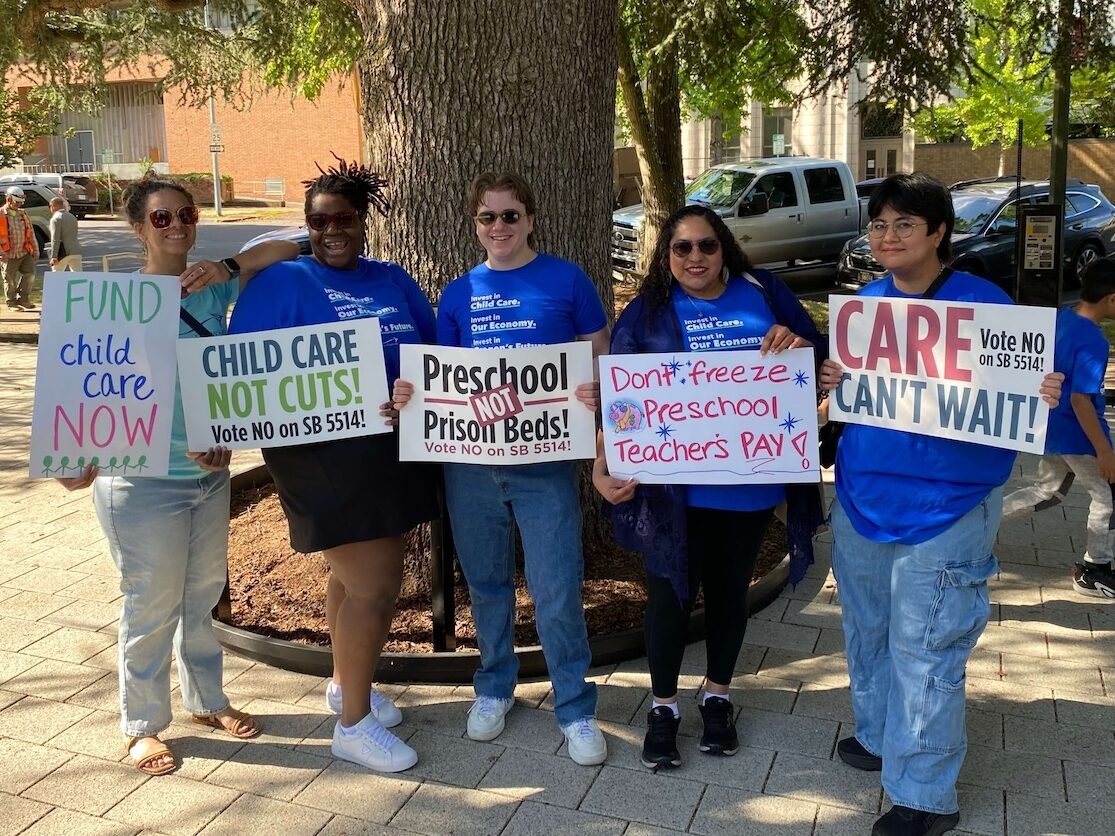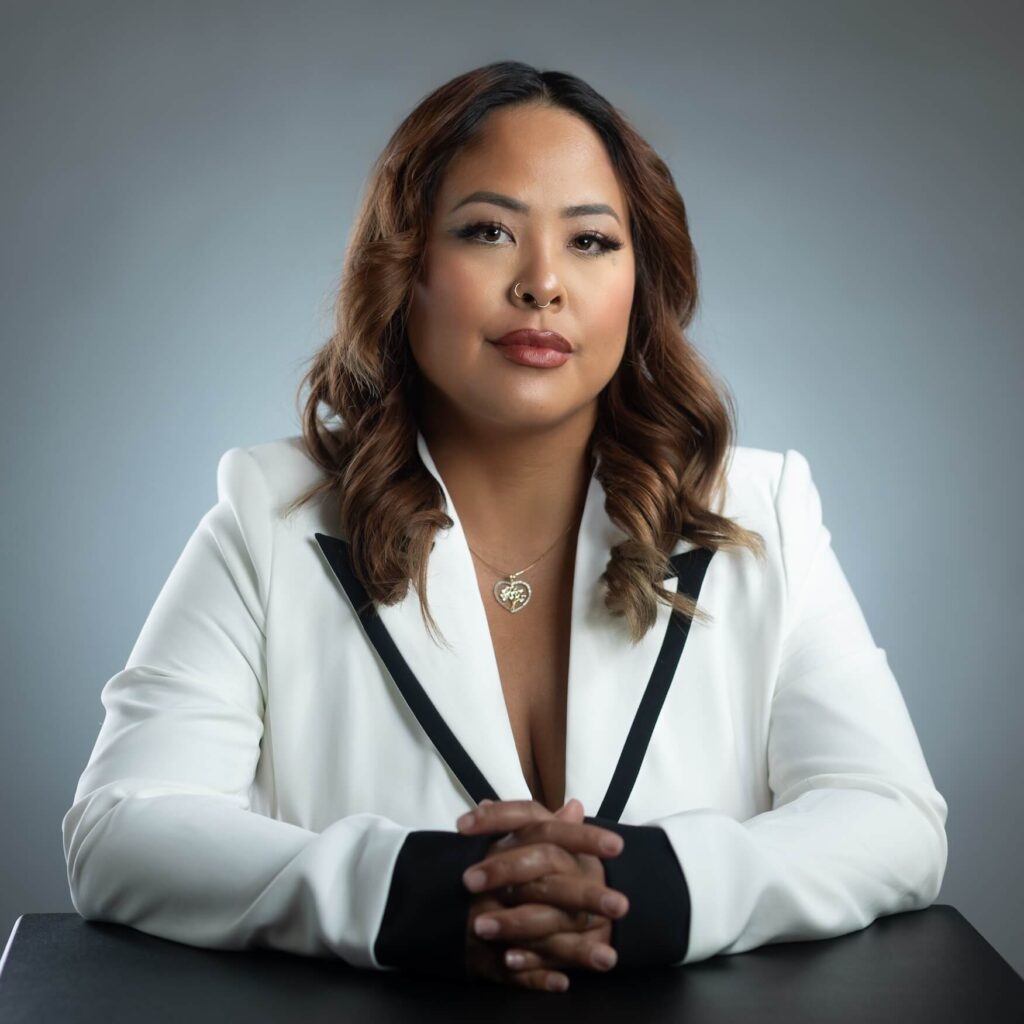
The 2025 legislative session sine die was late Friday night June 27, 2025 with no notable wins for Oregon’s care economy despite our super democratic majority and turnout by community and advocates.
Our top priorities for the 2025 legislative session focused on these main pillars: 1.) access and affordability; 2.) the child care workforce; and 3.) the economy. Going into the next biennium, the Department of Early Learning and Care projected $73M in a budget shortfall for the Employment Related Day Care (ERDC) Program. Additionally, our other legislative priorities saw the following negative outcomes.
- The Department of Early Learning and Care budget was cut by $65M (SB 5514 and HB 5006).
- The ways and means committee did not fund HB 2452, which would have provided additional fiscal support to local child care resource and referral agencies across the state to support parents getting connect to child care providers. Currently 25% of families approved for ERDC are not connected to a child care provider.
- The ways and means committee did not fund HB 3008, which would have continued a one-time $500 child care recognition bonus payment to child care providers. The Oregon Child Care Development Center has been paying out these bonuses for the past two years and will be missing more than 48,000 child care providers who have not yet accessed the bonus. And while there was strong support to fund child care workforce programs, lawmakers failed to address opportunities to bridge the workforce shortage.
- HB 2450, or the Child Care Impact Statement bill, would have required the legislature to prepare a child care impact statement on any major investment package that includes increasing labor, identifying child care needs for workers when expanding the workforce. HB 2450 was in committee upon sine die.
- HB 2593 transitioned to a work group that will convene later this year in collaboration with DELC, legislators, and advocates to study and provide strategies to alleviate the waitlist and have proportionate representation by working and student parents.
Oregonians do not benefit from these shortcomings. Working families and children will be negatively impacted by the budget cuts for the next two years.
Highlights and Hope from the Community
We are continuing to build our team and strategizing to bring our unfinished business back to lawmakers in the 2026 short legislative session. We’ve built the momentum! Thank you for joining us in our efforts.
Some highlights from this session include:
- Our Family Forward Lobby Day saw over 100 parents and providers signed up to rally to the Capitol.
- During the Ways and Means Roadshow, more than 70 testimonies were submitted from across the state uplifting the critical investment needs.
- Together, in coalition with the Oregon Working Families Party and Preschool For All advocates, we worked to shut down Governor Kotek’s attempt to dissolve the program. We held a press conference and spoke with many media outlets about the governor’s underhanded attempt to undo the will of the voters. And Senate Bill 106 did not advance this session.
Meet the Team

Marchel Kaleikini (she/her)
Political Director

Delina Biniam (she/her)
Advocacy Manager

Andrea Metheney (she/her)
Legislative Coordinator
Miranda Miller (she/her), Jennifer Williamson (she/her)
Contracted Lobbyists
Our amazing team is supported by Family Forward’s Movement Building Team, Deputy Director, Executive Director and Communications team. This year was also the first year we developed a Legislative Coordinator position! Let’s get to know a little bit about our first Legislative Coordinator, Andrea Metheney:
Q: Tell us about your role as the Legislative Coordinator! What does it entail?
A: As the new (and first!) Legislative Coordinator for Family Forward, my role sits at the intersection of policy and people. I serve as a bridge between Family Forward’s values and mission to center the voices of families, parents and care providers, to the decision makers who shape the laws that impact us all. More specifically I track legislation, analyze policy proposals with our Movement Building Team, and keep our organization informed on what is happening at the state level. One of my favorite tasks is reaching out to lawmakers to schedule meetings for our incredible Political Team. I enjoy getting to know elected officials and their staff and honing in on the fine art of the “gentle nudge” to remind legislators that we are advocating for thousands of children, families, and care providers across the state when we want to meet with them, all of these voices matter, and I am honored to remind them.
Whether planning Lobby Days, submitting constituent testimonies, or helping plan and execute fast moving Days of Action, my focus remains on translating grassroots energy (we have so much!) into real policy impact with tangible outcomes.
Q: What brought you to advocacy?
A: I didn’t arrive to advocacy work by chance or through a curious interest, I came to this work as a result of navigating systems that failed to support me as a single mom and domestic violence survivor. I have experienced firsthand how state and federal policy choices-or lack thereof-leave moms like me with limited and often impossible decisions. The truth is, it wasn’t a lack of strength or determination, it was the absence of structural and systemic support that caused the most stress and frustration for me as a young parent in a challenging socioeconomic position. It was the chronic underfunding of programs that in theory, protects us, but far too often falls short. It was observing systems that punish instead of uplift. For me, advocacy isn’t theoretical, it is how I have survived, and now it is about transformation. I stepped into this work because I know how urgently we need change, and because I believe the people closest to the pain of broken systems must be uplifted first and foremost.
How did the CCFO parent cohort prepare you for your role and develop you as a leader?
A: The Child Care for Oregon Parent Cohort was a pivotal experience for me! I have always been interested in the political process, organizing and advocacy work, but had not had the opportunity to be in spaces that fostered this interest. So many single parents are forced to live in a state of survival, so up until the opportunity to participate in the Parent Cohort, I only had time to pursue this interest in limited ways. Through the Parent Cohort experience, I gained hands-on experience in policy advocacy and began to learn ways to navigate the (purposely) complex intersection of legislation and real life impact. This cohort not only deepened my understanding of the challenges parents face in finding high-quality childcare, but also empowered me to become a vocal advocate for systemic change. Through the fantastic leadership of the cohort, I developed skills in organizing, coalition-building, and elevating the voices of those directly affected by policy decisions. This experience reinforced the importance of centering the lived experiences of parents in the advocacy process, and prepared me to enter my role as Legislative Coordinator with purpose and clarity, focusing on policies that truly serve families and communities in need. To sum it up, it was truly a life changing transformative experience!
Q: What are the best and most challenging parts of the job?
A: The best part of this job, hands down, are the people I have the joy and honor of working with everyday in our organization, as well the incredible people I have had the pleasure to meet along the way; parents, care providers, advocates, passionate community members, folks from other organizations and elected officials. It brings me great comfort to know that despite the massive work we have in front of us, and an often unsettling political landscape, that there are so many us, relentlessly working to make the world a place where everyone can thrive. With that being said, the most challenging part of this job is the incredibly complex political system we currently live under. From my vantage point, so much of the process is designed to be difficult to understand, challenging to participate in, and often leaves out the voices we most need to hear. It can be difficult to wrap our heads around the details of how a bill becomes a law, and the learning curve can feel overwhelming. It motivates me to continue this work and to demystify the process so as many people as possible can feel comfortable enough to use their voices and participate.
Q: What would you share to folks in the community who have never worked in this field but want to learn more?
A: Great question. My first piece of advice would be to take chances and try new things. Find groups that align with your political interests and passions and lean in. Show up, even when you are nervous or aren’t sure if you belong. When you find the right people and groups, you will feel welcomed, encouraged, and begin to recognize spaces that foster the things that matter to you most. If you are interested in working in this field, beginning to unpack how the system works with people who have been on the ground and in the weeds is vital. Ask questions, no question is silly! I would be embarrassed to ask questions when I first started, (surely I should know what all these acronyms mean!), but I quickly learned that so much important work and discussion lives in the questions we have, and remember, if you have a question, I guarantee you will be in good company. If you are able, come to the capitol in Salem, listen in on house and senate hearings, it helps humanize the process and is interesting and sometimes juicy! And lastly, I will say this, you don’t have to have a degree, or be a certain “type” of person to be in the world of politics. We need all voices represented, and the more of us who show up with a genuinely authentic interest, the better the world will be. We need everyone in the fight!
With so much political turmoil locally and at the national level, we know things can feel overwhelming. We invite you to join us in getting into some good trouble!
- Sign up for our email alerts for calls to action you can take over the summer and beyond.
- Run for office and center the care economy!
- Join the endorsement committee to inform The Mother Pac’s candidate endorsements for the 2026 elections. For those interested in joining the committee, please email The Mother PAC at info@motherpac.org.
